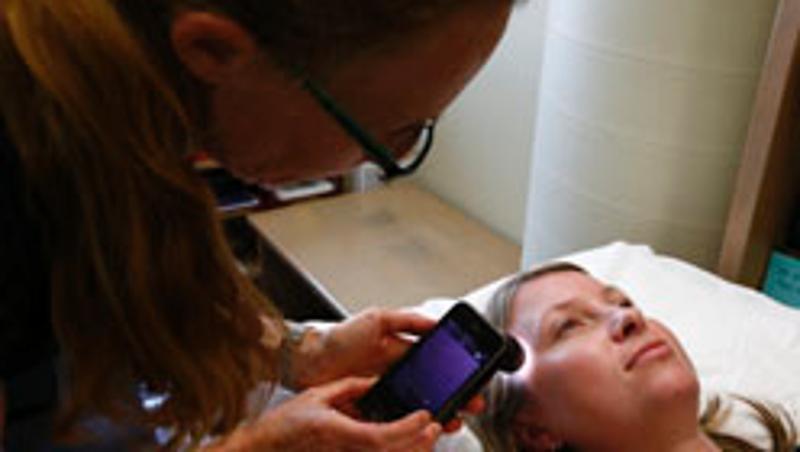
A clever optical device that turns the ordinary iPhone into a personal skin scanner is set to turn cancer detection on its head.
QUT senior research fellow Dr Monika Janda and her team from the School of Public Health, in collaboration with Prof David Whiteman from QIMR and Prof Peter Soyer from the Dermatology Research Centre, UQ, are trialling the science-fiction-like new technology that allows individuals to scan their own skin, take photos of suspect spots, record them in an app, and then send the data on to health professionals.
"Our group is the first to try out this device, called the HandyScope, used by consumers," Dr Janda said.
"It is capable of doing really cool things. It automatically gets people to hold the iPhone at the right distance to take a clear photo, it has polarised light that goes deeper into the skin to show lesions clearer, and it has a 20x magnification capacity.
"Then it has an app attached to it, that allows people to mark on a virtual body where the legion is, and they can send it straight back to a health professional for quick feedback."
She said if the trial showed the HandyScope was useful and usable by consumers, it would revolutionise health care. Doctors could advise patients to use the device at home, to keep an eye on suspect skin spots. This would enhance early detection and ultimately improve cancer treatment outcomes.
Recovering skin cancer sufferers who have to visit a specialist every few weeks could use this technology to extend face-to-face examination intervals - particularly useful for those people living in rural or remote areas.
Dr Janda said the team was recruiting via the QSkin study, but also looking for other people aged between 50 and 64 years to join the free trial. Participants would be asked to complete a short survey. Some of the candidates would then be asked to try out the HandyScope at home.
To join the trial, phone 3138 3018 or email M.Janda@qut.edu.au
MORE INFORMATION:
More than 2000 Australians die every year from skin cancer (Australian Bureau of Statistics).
Two in three Australians will be diagnosed with skin cancer by age 70 (sunsmart.com.au)
A similar scope attached to an iPhone was used by the Sherlock Holmes character in Channel 10's Elementary television show
Details of the HandyScope can he found here
MEDIA CONTACT:
Amanda Horswill | Communications Officer (Mon to Thurs) | QUT Marketing & Communication | 07 3138 1150 | a.horswill@qut.edu.au
Related News:
DNA research identifies genetic risks for prostate, breast and ovarian cancers
Bowel and breast cancer deaths avoidable


